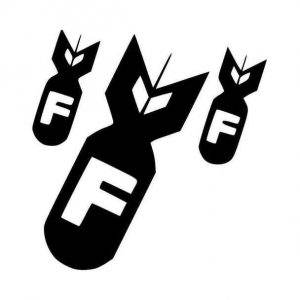Handling F-bombs, Death threats, and job threats from your abusive customers

In this age of Customer Experience, numerous companies say, ‘customers are the lifeblood of our business.’ They also may tell their investors, customers, and employees:
– “Customers are always right.”
– “Customers are the reason we’re here.”
– “No customer; no you.”
Those taglines should apply to most of our customers, but there is a tiny minority who are sheer dumb-asses. Let’s face it, there are some terrible customers out there. Many will negatively affect your company’s profits and employees.
Today I’d like to suggest some employee strategies on handling some of your worst customers both face-to-face and over-the-phone situations. As a former customer service agent, I’d get terrible customers about once every six months. I call such customers ‘abusives’. These are the customers who f-bombed me with all kinds of personal obscenities, insults, or threats. Angry customers are easy to handle in comparison.
In EVERY customer service or debt collections workshop I run, someone will say, “What do I do if a customer calls me a !@%&%#*?” This question comes from whatever country I’m in: from Afghanistan to Singapore– from Malaysia to the U.S.
So, how do you handle abusive customers who hit below the belt? Let me share some quick techniques to handle such customers either face-to-face or over the phone.
Handling F-Bombs and other obscenities
Let’s say the customer starts to f-bomb you or calls you other nasty words. These can include insults against your race, religion, country, gender, sexual preference, physical features, intelligence, or whatever.
- 1st Rule: Do Not Try to Teach or Scold Them! You are paid to help as many customers as possible, not teach morality lessons. Plus, you will only make them more abusive.
- 2nd Rule: Do Not Immediately Use Power on Them! Do not say something like, “Sir/Madam, if you continue with this way of speaking, I will terminate the call.” Or for counter staff, “Sir/Madam, if you continue with this way of speaking, I will call Security.” The word ‘IF’ is a threat. An abusive might even correctly respond, “Are you threatening me?”
Here are some better responses or strategies after a horribly nasty customer statement:
1. “Mr./Ms. ________, I’m trying to help you. But when you use words like these, I won’t be able to help you.” Then shut the hell up. No moralizing. No power. This phrase works on 90% of my f-bombing abusives. The magic word here is ‘help’. I use it twice. I want the abusive to see that I am trying to help him, not hurt him. By hurting me, he is hurting himself.
But let’s say you have one of the 10% who still remain abusive. Here are some secondary responses after you have tried response #1 (in order of my preference):
a) (Say this with a tear or strong emotion in your voice). “Mr./Ms. _______. I’m sorry I upset you. I was just trying to help.” This is especially powerful when used by a female on a male customer.
b) “Mr./Ms. ________. I’m sorry this call is being recorded.” This works better in Asia than in the U.S. In the U.S. customers can say, “I don’t care.” Again, don’t use this as your first response.
c) (If abusive still persists after you used #1, ‘a’, and/or ‘b’). “Mr./Ms. ______. I’m sorry but I will need to terminate this call.” For counter staff, “Mr./Ms. ______. I’m sorry but I’ll need to get my manager / security.”
d) (Emergency response to be used only when abusives shout MANY obscenities at you).
– Warning #1: Use only after receiving permission from your supervisor.
– Warning #2: Use only for phone abusives.
– Warning #3: Use only by females.
“Ooooooh, I love it when you talk dirty.” What will abusives do when they hear this response? They’ll be shocked. This was the last thing they expected you to say. Shock can be a wonderful thing because it makes them stop and allows you to take control. Abusives likely won’t complain to your supervisor as they will have to share all the pornographic words that they used against you. Still, be EXTREMELY careful if you use this technique.
Other strategies:
2. Silence (no response). Count five seconds, then go into problem-solving mode.
3. Transfer. If I’m unable to personally connect with an abusive, I’ll transfer to a colleague who is preferably of a different gender. Sometimes it works.
Handling Death Threats and Job Threats
Death threats
Hopefully you never get one, but if you do let me share what I did. In one of my jobs, I was the guy who received all barred cell phone calls due to non-payment. It’s called ‘hotlining’. This particular call was my last call of the day. The customer gave me his cell phone number and I looked it up in the system. I politely said, “Mr. Customer, I’m sorry but the line was barred due to two credit card transactions that were rejected for insufficient funds. But it’s easy to fix, just pay $5,000 by transfer or certified funds and I can re-open you line within 30 minutes.”
He became abusive and the call stretched way past closing time. It lasted nearly 30 minutes.
He wanted me to reconnect the line without any payment. I couldn’t. I used my earlier #1 go-to abusive response. It didn’t work. Then I used another alternative. It didn’t work. Finally I used power, “Mr. Customer, I’m sorry but I will need to terminate this call.” I hung up.
The customer immediately called back, but this time he spoke to my colleague, Becky. She had heard our earlier conversation and told the man that there was nothing she could do without a solid payment. He refused. He then asked for my full name because he wanted to put a ‘hit’ on me. Becky politely terminated the call. We reported the death threat, per company policy, to our legal department. I’m still alive 30 years later.
My tip for death threats on-the-phone, politely terminate the call and report it. For counter staff, this is much harder for you, but I’d involve security and/or management. I conducted a customer service workshop at a telco in Afghanistan. One of the learners asked, “What should I do when an armed Taliban comes into my branch and says, ‘Give me a free SIM card?’” My response, “Give him a free SIM!” Maybe give him two.
Job Threats
These might not be death threats, but they are still nasty. These abusives are bullies. They usually start with the word ‘If’. E.g. “If you don’t do ……., I will…… contact your boss / write to the newspaper / blog it / take my business elsewhere / contact your chairman / get you fired, etc.” I handle these customers by trying to speak politely and confidently, while hitting them with facts.
My standard responses:
1. (Face-to-Face): “Mr. / Ms. Customer, that’s your option; however, this issue was caused by …… (explain situation’s facts and use the word ‘sorry’, then finish with an offer of help): Now, I’d like to help you if you give me a chance (then suggest solutions).”
2. (For Debt Collections call): “Mr. / Ms. Customer, that’s your option; however, (boss / chairman / newspaper, etc.) will also see your account has had no payment for X months. Now, I’d like to help you if you give me a chance.”
Note: for both Customer Service and Debt Collections, if the abusive insists to speak with my boss, I will brief my boss and transfer the call or pass the customer. If my boss is away, I will take a message and promise to deliver it.
So, my summary tips on handling abusives:
- Don’t teach morality lessons.
- Don’t immediately use power like hanging up or reporting them to security (unless a death threat). Instead, first show them that you are trying to help.
- Do use the magic word ‘help’, but if they don’t want your help, consider other options. Their abusive behavior is often a ploy to get help.
- Do report any death threats. If you’re face-to-face, give him/her whatever.
- Do use facts on abusives who threaten you, then offer help. (Note: this applies for non-life-threatening situations).
The world of Customer Service allows us to meet all kinds of people. Most are nice, polite, and harmless. Some a bit angry and a tiny minority just plain abusive. Good luck.
Steve is an American trainer based in Malaysia since 1995. He’s the author of Debt Collections: Stir-Fried or Deep-Fried? President of ServiceWinners International Sdn. Bhd. www.servicewinners.com, steve@servicewinners.com



